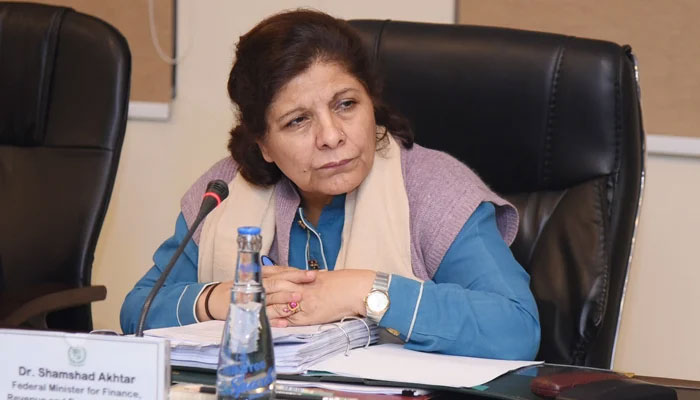Pakistan exploring debt for nature swaps: Shamshad
Islamabad:Dr Shamshad Akhtar, Caretaker Minister for Finance, Revenue and Economic Affairs, has said that amid growing international fiscal constraints, the country is exploring debt-for-nature-swap with global agencies to enhance its market competitiveness as foreign direct investment is harder to fetch in these testing times.
Dr Shamshad was speaking at a high-level plenary on “Reforms for a brighter Future” at the last day of 26th Sustainable Development Conference organised here by Sustainable Development Policy Institute.
Dr Shamshad said after months of hard work, the interim leadership successfully reached a staff level agreement with IMF for a standby $3 billion loan grant. She added that the government was committed to IMF programme which should be a homegrown agenda of Pakistan.
Keynote Speaker, Dr Luis Felipe López-Calva, Global Director, Poverty and Equity Global Practice, The World Bank, said that the world entered a structurally lower growth. In Pakistan, he said, the economic growth was insufficient to reduce poverty whereas the external elements or partners could not bring change in an economy.
Najy Benhassine, the World Bank Country Director, said human capital crisis is a silent disaster that did make news headlines as 40% children under 5 years of age in Pakistan are stunted which is the most pressing challenge for the long-term growth of Pakistan. He suggested prioritising the issue by focusing child stunting reduction, quality of water and availability nexus, human capital crisis, developing private sector, the energy sector which is vital for RE transition and important for macroeconomic stability, water and agriculture nexus, low agriculture productivity and creating fiscal space because it will require huge finances.
Senator Mushahid Hussain Sayed said China-Pakistan Economic Corridor (CPEC) has got a fresh impetus after the recent visit of the Pakistan’s political and military leadership to China and new initiatives have also been taken under this mega project. He said despite the lack of governance, bureaucratic incompetence and inconsistencies in certain areas, our all-weather friend China is still willing to support Pakistan.
Dr Suleri informed the audience that SDPI is working on climate smart agriculture project to enable the country’s agriculture sector to be more climate resilient. He said tap the green opportunities under CPEC, SDPI formed a 10-memebr steering committee (five members each from Pakistan and China). Dr Zhang Jiangyu, Executive Director of BRI Development Institute, said Pakistan-China bilateral economic cooperation is going to turn into green cooperation.
Shakeel Ahmed Ramey, the CEO of Institute of Eco-civilisation Research and Development, pointed out the idea of building green cities on new concepts and models to avoid emerging environment challenges such as smog. He said 78% energy is consumed in cities and 60% of greenhouse gas emissions come from cities, which needs to be lowered.
Dr Waqar Masood Khan, Advisor to Prime Minister on Finance, said that the inflationary situation started with the Ukraine war as the price of oil and other commodities skyrocketed, and Pakistan cannot be singled out in this respect.
Dr Amjad Saqib, the Chairman of Benazir Income Support Programme, said despite the country’s growing vulnerability due to climate change and weak social safety net, no city or province has replicated the Sustainable Development Goals. Whether we really want to achieve the SDGs is a matter of political will, he said.
-
 FAA Shuts Down El Paso Airport, Flights Suspended For 10 Days: Here’s Why
FAA Shuts Down El Paso Airport, Flights Suspended For 10 Days: Here’s Why -
 Kate Middleton, Prince William's Major Plan Revealed After Statement On Andrew Scandal
Kate Middleton, Prince William's Major Plan Revealed After Statement On Andrew Scandal -
 Teacher Abused Children Worldwide For 55 Years, Kept USB Log Of Assaults
Teacher Abused Children Worldwide For 55 Years, Kept USB Log Of Assaults -
 Nick Jonas Set To Showcase Acting Skills In Upcoming Thriller 'Bodyman'
Nick Jonas Set To Showcase Acting Skills In Upcoming Thriller 'Bodyman' -
 Milano-Cortina 2026: Assessing Italy’s Winter Olympics Economic Growth
Milano-Cortina 2026: Assessing Italy’s Winter Olympics Economic Growth -
 Chris, Liam Hemsworth Support Their Father Post Alzheimer’s Diagnosis
Chris, Liam Hemsworth Support Their Father Post Alzheimer’s Diagnosis -
 Savannah Guthrie Expresses Fresh Hope As Person Detained For Questioning Over Kidnapping Of Nancy
Savannah Guthrie Expresses Fresh Hope As Person Detained For Questioning Over Kidnapping Of Nancy -
 ByteDance Suspends Viral Seedance 2.0 Photo-to-voice Feature: Here’s Why
ByteDance Suspends Viral Seedance 2.0 Photo-to-voice Feature: Here’s Why -
 Tom Hanks Diabetes 2 Management Strategy Laid Bare
Tom Hanks Diabetes 2 Management Strategy Laid Bare -
 Bad Bunny Wins Hearts With Sweet Gesture At Super Bowl Halftime Show
Bad Bunny Wins Hearts With Sweet Gesture At Super Bowl Halftime Show -
 Why Angelina Jolie Loves Her 'scars' Following Double Mastectomy
Why Angelina Jolie Loves Her 'scars' Following Double Mastectomy -
 ‘World Is In Peril’: Anthropic AI Safety Researcher Resigns, Warns Of Global Risks
‘World Is In Peril’: Anthropic AI Safety Researcher Resigns, Warns Of Global Risks -
 Meghan Markle Receives Apology As Andrew Puts Monarchy In Much Bigger Scandal
Meghan Markle Receives Apology As Andrew Puts Monarchy In Much Bigger Scandal -
 Catherine O’Hara Becomes Beacon Of Hope For Rectal Cancer Patients
Catherine O’Hara Becomes Beacon Of Hope For Rectal Cancer Patients -
 Nancy Guthrie: Is She Alive? Former FBI Director Shares Possibilities On 10th Day Of Kidnapping
Nancy Guthrie: Is She Alive? Former FBI Director Shares Possibilities On 10th Day Of Kidnapping -
 Siemens Energy Profit Surges Nearly Threefold Amid AI Boom For Gas Turbines, Grids
Siemens Energy Profit Surges Nearly Threefold Amid AI Boom For Gas Turbines, Grids




